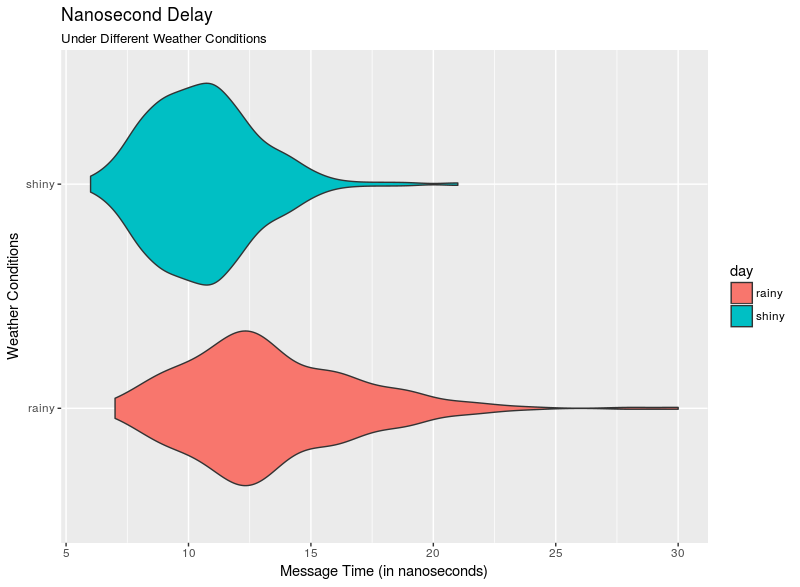

R has excellent tools for dates and times. The Date and
POSIXct classes (as well as the ‘wide’ representation in
POSIXlt) are versatile, and a lot of useful tooling has
been built around them.
However, POSIXct is implemented as a double
with fractional seconds since the epoch. Given the 53 bits accuracy, it
leaves just a bit less than microsecond resolution.
Furthermore, using floating-point arithmetic for an integer concept
opens the door to painful issues of error accumulation.
More and more performance measurements, latency statistics, etc., are
now measured more finely, and we need nanosecond resolution for
which commonly an integer64 is used to represent
nanoseconds since the epoch.
And while R does not have a native type for this, the bit64 package by Jens Oehlschlägel offers a
performant one implemented as a lightweight S3 class. So this package
uses the integer64 class, along with multiple helper
functions for parsing and formatting at nano-second resolution from the
RcppCCTZ
package which wraps the CCTZ
library from Google. CCTZ is a modern C++11 library extending the
(C++11-native) chrono type.
In addition to the point-in-time type nanotime, this
package also provides an interval type nanoival which may
have open or closed start/end, a period type nanoperiod
that is a human representation of time, such as day, month, etc., and a
duration type nanoduration. These types are similar to what
the lubridate
package proposes.
Set and arithmetic operations on these types are available. All
functionality is designed to correctly handle instances across different
time zones. Because these temporal types are based on R built-in types,
most functions have an efficient implementation and the types are
suitable for use in data.frame and data.table.
nanotime is also a better choice than the native
POSIXct in most of the cases where fractional seconds are
needed because it avoids floating point issues.
Package documentation, help pages, a vignette, and more is available here.
See the included demo script nanosecondDelayExample.R for a (completely simulated and hence made-up) study of network latency measured in nanoseconds resulting in the figure below

R> x <- as.nanotime("1970-01-01T00:00:00.000000001+00:00")
R> x
[1] "1970-01-01T00:00:00.000000001+00:00"
R> x + 1e9
[1] "1970-01-01T00:00:01.000000001+00:00"
R> as.nanotime("2020-03-21 Europe/London")
[1] 2020-03-21T00:00:00+00:00R> options("width"=60)
R> v <- nanotime(Sys.time()) + 1:5
R> v
[1] 2020-03-22T03:09:20.732122001+00:00
[2] 2020-03-22T03:09:20.732122002+00:00
[3] 2020-03-22T03:09:20.732122003+00:00
[4] 2020-03-22T03:09:20.732122004+00:00
[5] 2020-03-22T03:09:20.732122005+00:00
R>zooR> library(zoo)
R> z <- zoo(cbind(A=1:5, B=5:1), v)
R> options(nanotimeFormat="%H:%M:%E*S") ## override default format
R> z
R> options(nanotimeFormat=NULL) ## go back to default format
R> zR> library(data.table)
R> dt <- data.table(v, cbind(A=1:5, B=5:1))
R> fwrite(dt, file="datatableTest.csv") # write out
R> dtcheck <- fread("datatableTest.csv") # read back
R> dtcheck
R> dtcheck[, v:=nanotime(v)] # read as a string, need to re-class as nanotime
R> fread("../datatableTest.csv", colClasses=c("nanotime", "integer", "integer"))This requires version 0.0.2 or later.
R> data.frame(cbind(A=1:5, B=5:1), v=v)R> ival <- as.nanoival("+2009-01-01 13:12:00 America/New_York -> 2009-02-01 15:11:03 America/New_York-")
R> ival
[1] +2009-01-01T18:12:00+00:00 -> 2009-02-01T20:11:03+00:00-
R> start <- nanotime("2009-01-01 13:12:00 America/New_York")
R> end <- nanotime("2009-02-01 15:11:00 America/New_York")
R> nanoival(start, end) # by default sopen=F,eopen=T
[1] +2009-01-01T18:12:00+00:00 -> 2009-02-01T20:11:00+00:00-
R> nanoival(start, end, sopen=FALSE, eopen=TRUE)
[1] +2009-01-01T18:12:00+00:00 -> 2009-02-01T20:11:00+00:00-
R> intersect(as.nanoival("+2019-03-01 UTC -> 2020-03-01 UTC-"),
as.nanoival("+2020-01-01 UTC -> 2020-06-01 UTC-"))
[1] +2020-01-01T00:00:00+00:00 -> 2020-03-01T00:00:00+00:00-
R> union(as.nanoival("+2019-03-01 UTC -> 2020-03-01 UTC-"),
as.nanoival("+2020-01-01 UTC -> 2020-06-01 UTC-"))
[1] +2019-03-01T00:00:00+00:00 -> 2020-06-01T00:00:00+00:00-
R> setdiff(as.nanoival("+2019-03-01 UTC -> 2020-03-01 UTC-"),
as.nanoival("+2020-01-01 UTC -> 2020-06-01 UTC-"))
[1] +2019-03-01T00:00:00+00:00 -> 2020-01-01T00:00:00+00:00- R> as.nanoperiod("1y1m1w1d/01:01:01.000_000_001")
[1] 13m8d/01:01:01.000_000_001
R> nanoperiod(months=13, days=-1, duration="01:00:00")
[1] 13m-1d/01:00:00
R> ones <- as.nanoperiod("1y1m1w1d/01:01:01.000_000_001")
R> nanoperiod.month(ones); nanoperiod.day(ones); nanoperiod.nanoduration(ones)
[1] 13
[1] 8
[1] 01:01:01.000_000_001
R> plus(v, as.nanoperiod("1y1m"), tz="UTC")
[1] 2021-04-22T03:09:20.732122001+00:00
[2] 2021-04-22T03:09:20.732122002+00:00
[3] 2021-04-22T03:09:20.732122003+00:00
[4] 2021-04-22T03:09:20.732122004+00:00
[5] 2021-04-22T03:09:20.732122005+00:00R> nanoduration(hours=1, minutes=1, seconds=1, nanoseconds=1)
R> as.nanoduration("00:00:01")
R> as.nanoduration("-00:00:01")
R> as.nanoduration("100:00:00")
R> as.nanoduration("00:00:00.000_000_001")R> from <- as.nanotime("2018-09-14T12:44:00+00:00")
R> seq(from, by=as.nanoperiod("1y"), length.out=4, tz="Europe/London")
[1] 2018-09-14T12:44:00+00:00
[2] 2019-09-14T12:44:00+00:00
[3] 2020-09-14T12:44:00+00:00
[4] 2021-09-14T12:44:00+00:00The bit64
package (by Jens Oehlschlägel)
supplies the integer64 type used to store the nanosecond
resolution time as (positive or negative) offsets to the epoch of
January 1, 1970. The RcppCCTZ
package supplies the formatting and parsing routines based on the
(modern C++) library CCTZ
from Google, when the parsing cannot be done using a fast built-in
parser. integer64 is also used for the type
nanoduration, whereas nanoival and
nanoperiod are stored in a complex, i.e. over
128 bits.
The package is by now fairly mature, has been rewritten once (to go from S3 to S4) and has recently received a sizeable feature extension. There may still be changes, though there should generally never be breaking ones. The package also has an extensive test suite, and very good code coverage.
See the issue tickets for an up to date list of potentially desirable, possibly planned, or at least discussed items.
The package is on CRAN and can be installed via a standard
install.packages("nanotime")whereas in order to install development versions a
remotes::install_github("eddelbuettel/nanotime") # dev versionshould suffice.
Dirk Eddelbuettel and Leonardo Silvestri
GPL (>= 2)